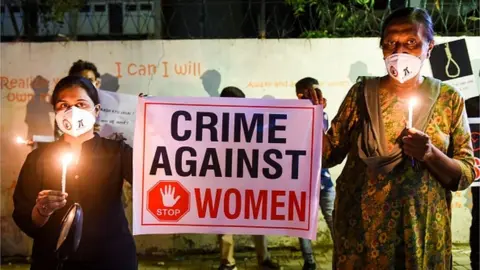Hardoi: India man arrested for beheading teenaged daughter
 Getty Images
Getty ImagesPolice in the northern Indian state of Uttar Pradesh have arrested a man suspected of beheading his daughter.
Sarvesh Kumar was arrested as he walked towards a police station carrying the severed head of the 17-year-old girl.
In a video shot by the police, he is heard saying that he was angered by his daughter's alleged affair with a man he did not like.
Hundreds of people are killed each year for falling in love or marrying against their families' wishes in India.
In the video, the man says that he had recently found out about this daughter's relationship and that had made him very angry.
He is heard saying that he found her alone at home, locked her in a room and beheaded her with a sharp object.
Alarmed at the sight of a man walking with a severed head, local people alerted the police.
The man told the police that he had left the body and the murder weapon "in the room" and was on his way to the police station.
Police say an investigation is being carried out.
Meanwhile, a policeman was suspended after a photograph showed him carrying the severed head inappropriately.
Wednesday's crime took place in Hardoi district in Uttar Pradesh. Last year, the state topped the list of Indian states with the highest number of crimes against women, according to the National Crime Records Bureau.
Murders by family members for being in a relationship are known as "honour killings" and although there are no authentic figures, campaigners say hundreds of so-called "honour crimes" take place every year in India.
Age-old notions of tradition and family honour are still deeply entrenched in many parts of Indian society.
Many victims anger their families by marrying outside their caste and religion and often these crimes against them are endorsed, or even encouraged, by village-based caste councils.
In 2011, the Supreme Court said that people convicted of so-called honour killings should face the death penalty.
